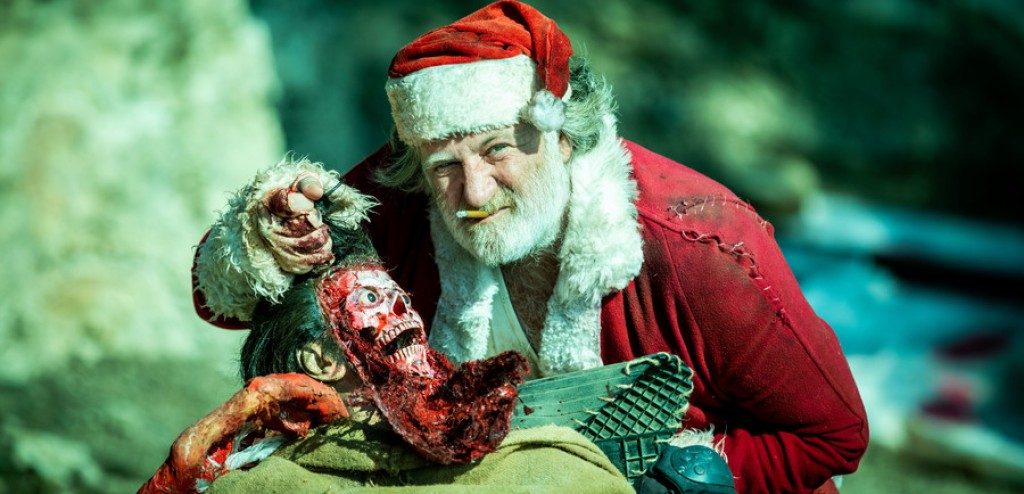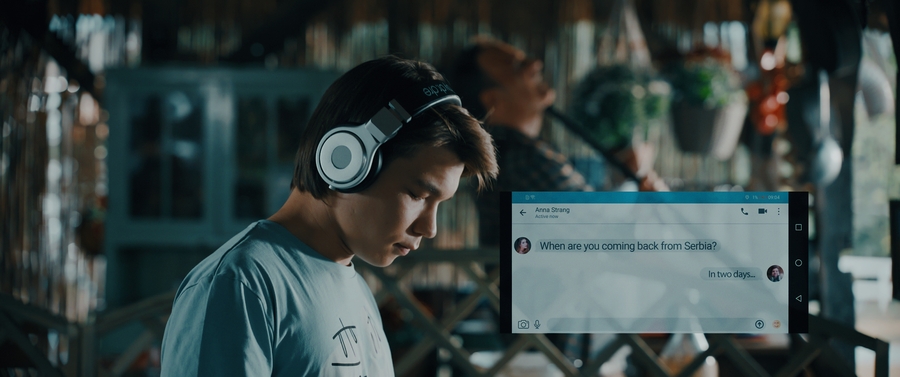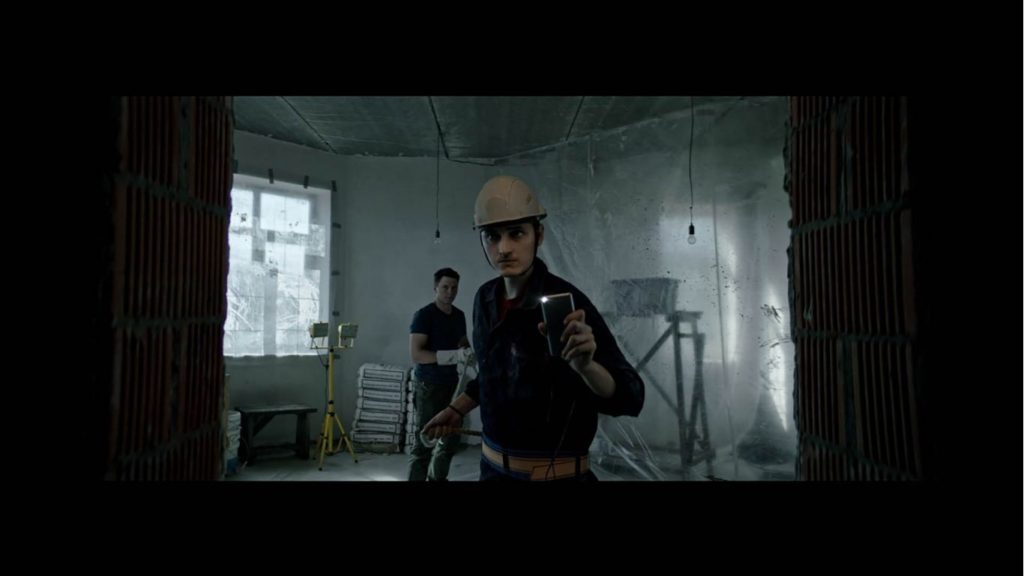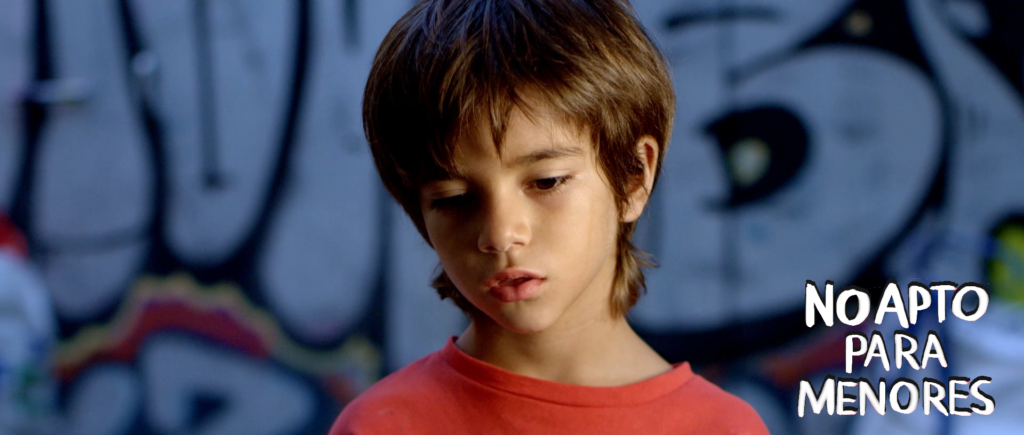Melies d’Argent Short Film Selection Review
Taking a recognizable classic and adding one’s spin to it – the winner of this year’s Melies d’Argent award for the best European fantastic short film at 2020’s Grossmann Fantastic Film and Wine Festival, offers familiar sights while telling a whole new story.
Slice of Life (HR/25’/2019), the Croatian short directed by Luka Hrgović and Dino Julius emulates with astonishing ease the look of 80s classic ‘Blade Runner’, with its now anachronistic technology, the ever dark rainy downtown area, big diffused areal lights and larger than life advertisement display boards. Even the music vibrates with synthesizer elements and there are the obligatory noodle snack stalls and Chinese letterings.
Unlike the Ridley Scott classic, which dealt with the ethics and reality of life on a human and organic level, Hrgović and Julius approach their take from a consumeristic side. Told entirely without dialogue between the characters and only by pager messages, ad voice overs, and facial expressions, there is a raw realism to the setup. An unnamed man is aiming to leave the misery of earthly existence behind him and take a spaceship to the off-world islands, a propagated paradise, that promises white sand beaches, crystal clear water, and pretty women in white bathing suits.
Leaving earth behind, however, comes at a price of 10.000 units of this future currency, unachievable for most of its inhabitants. To accumulate the sum, the man robs ATMs, pulls off drug deals, lives of garbage bin food and sleeps in his car. When the story sets in, he has only a few hours left to board the ship, but trouble is waiting for him when a dirty cop learns of his money treasure and has plans of his own.
Besides the doomsday-like countdown for the off-world islands ship, another ad keeps catching the eye of the man. Slice of Life, a cigarette brand that promises a stress relieving puff leading to a more relaxed approach to life. In a desperate moment for the hero, it shapes up to serve as exactly that. But instead of a silver lining, it feels more like a mere construct. But then again, would the off-world islands have provided this reality of a good life? Or are they an even bigger construction?
Playing with a similar homage to movie classics of old, The Last Christmas of the Universe (La ultima Navidad del universo/18’/ ES/ 2019) inverts the high-octane drama of the “Mad Max” series into a more comedic criticism of humanity and its destructive nature. Taking place on “December 25th, next year”, a band of outlaws and post-apocalyptic punks are inhabiting the sandy canyons of what once was civilization, covering the distance in their worn down cars. One of them is about to be killed by Pirado, also known as Looney and his gang. But instead of a lone road warrior, Santa Claus appears to his rescue.
In a world, where there are no good children left, Santa will repurpose their lovely toys to deadly weapons, attacking his opponents with marbles, game boys, yoyos, and even his sick version of Twister. Directors Adrián Cardona and David Muñoz leave little to the imagination. Their implementation of these deadly toys is creative and gruesome, their love for displaying body parts cracking, being torn apart, and thrown around the location sews delightful disgust within the viewer. “The Last Christmas of the Universe” is mindless fun, a sandbox for the filmmakers to go full gore.

Film still from “The Last Christmas of The Universe”. Courtesy of Catalan films 
Film Still from Danilo Beckovic’s “The Little One”
A post-apocalyptic setting is also what fuels Danilo Bećković’s The Little One (Mališan/ 13’/ SER/ 2019). A brother and a sister are staying with their dad in the countryside, all while the media keeps warning of a dangerous virus that seems to be resulting in a zombie apocalypse. As the boy heads into the kitchen for breakfast, his dad and the neighbors are fighting off the undead. Hell has broken loose. To him, however, it is just a photo op for his social media and a way to hit on a girl. Nothing is a real threat anymore, the short seems to say. Everything is seen through a filter of likes and page impressions. Only when he gets unplugged from his carefree online reality, do the circumstances finally kick in.
In the French Chicken of the Dead (10’/ FR/ 2019) directed by Julien David, even the apocalypse is consumerist. The 2D animated short spins the Scrooge theme in a way that the rich businessman Bernard, who runs the “Maybe Chicken” empire (50% chicken and 50% chemicals) is unable to resolve the impending crisis by just finding his inner goodness. His newest fake chicken is turning people into cannibalistic human-size chickens. To stop the process, he needs to remember his humble beginnings and produce the cure. But, just as everything in this and our world, humbleness and saving come at a price. The wheel of capitalist exploit keeps spinning.
Taking their cues from a similar popular entity, Brothers Again (Fratelli Come Prima/ CH/ 11’/ 2019) is a Swiss take on the ideas of ‘Black Mirror’. Vittorio goes to visit his brother Franco and his wife, a part of the family that he had broken with many years ago. Franco accuses him of having kept most of the family’s wealth to himself, except a precious Stradivari violin. The setup seems to be an innocent family drama. But director Vanja Victor Kabir Tognola sprinkles subtle little disturbances into the picture. Why do the outfits keep changing? Why does the wife say she has been dead for years? Is there some bigger mechanism at play?
Just like ‘Black Mirror’ mastermind Charlie Brooker, Tognola dives into matters of technology and humanity, even though unlike the former, this bone to pick is less centered on the technological interference with daily life, but the dark side of the human condition.
A similar spin on the question humanity vs technology is Grojo’s Conversations with a Monkey (Conversaciones con un mono/ ES/ 15’/ 2019). The once-popular sci-fi director Juan Siegman buys a creativity robot to help him write his newest screenplay. The robot offers some insight, but functions mostly as an archive of pop culture and an unethical accumulator of other people’s private messages. He blatantly talks about the errors of humanity and their lack of a future but is deprived of any personality or internal identity to truly suggest he might be the next step in evolution.
Another critical take on technology and the scientific future is Constance Guirlet’s Lunar Prospector One (16’/ FR/ 2019), directed by . As so often with the genre, it all starts with a dying and exploited earth. In the year 2076, Elijah, a lunar prospector, rides of in a spaceship of the same name as the short to solve the energy crisis on earth and find new resources. Unlike previous genre incarnations, his main issue is not the extraterrestrial life out there, but its fanbase on earth. To protect off-world life from human exploitation, a protest group, labelled terrorists by the mission control, attacks Elijah’s ship.
The plot itself may not hold many surprises and twists that aren’t obvious from the start, but the old school look of the spaceship and the minimalistic action creates a nostalgic aura, while at the same time feeding the formula new ideas.
Less gripping are the well-produced but pretty foreseeable Amadine and The Burden. In J. C. Mostaza’s Amandine (18’/ ES/ 2019), a young woman gets continuously drugged by a physician, the only other tenant in her apartment block and as it turns out, a women mutilating psychopath. With a jumpy timeline and a pretty by the numbers plot, the short convinces mostly with the eerie performance by lead Javier Pereira rather than how the story plays out.
Similarly, in Nico van den Brink’s The Burden (Het Juk/NL/17’/2019) , a young man brings his girlfriend to his remote family home to honor his dead and mysterious grandfather and meet his family, his two brothers, and his dad. A creepy neighbor is staring at the house day and night and the brothers just happen to drop the fact that she seems to be the first woman he has ever brought home. Also, there is a scary noise in the attic. The rest unravels exactly as one might imagine.
You will never be back (No podrás volver nunca/ 14’/ ES/ 2020) also plays to a familiar setup, offering little variation. A young woman enters a mysterious time loop in a “The Shining” inspired hallway. Nobody can remember her and as she crawls through a tunnel below a room, she stumbles upon herself again. Despite the little payoff, director Mónica Mateo Fernández succeeds at emulating the devasting feeling of being lost and abandoned very well.
Following common plot devices but still leaving room to interpretation is the Russian Exit (21’/ RU/ 2020) by Ivan Basov. Three construction workers are renovating a house when they come across a physical abnormality. A room seems to keep expanding, only to turn into a looming dark abyss. Should they go to investigate or report the incident? It may all seem familiar, but Basov adds a social, blue-collar aspect to it.
The idea to investigate this unnatural phenomenon and then sell it to the media to improve their small income or even later cover up the ensuing catastrophe, as to not be charged by men with more power, rings true to current society. There is reason given to these otherwise ludicrous acts that horror movie protagonists usually commit, giving the film a certain edge. And maybe even making this supernatural abyss less frightening than the real-world consequences.
In Not suitable for Children (No apto para menores/ 6’/ ES/ 2019), Catalan director Daniel Noblom reimagines the Film Noir concept by illustrating the gloomy voice over of the narrator with footage of a young boy. Instead of grilling witnesses, alcohol bribes and bloody bodies, the viewer follows a boy running around Barcelona with his mom, offering juice boxes to informants and examining torn apart dolls on the floor.
The parallels between a dark detective story and a kid investigating who broke his favorite toy are smart and entertaining. The expression in the young lead’s face even teases a deeper gravity to the happenings. As a matter of fact, the boy’s imagination occasionally does envision its opponents in a Black and White gangster scenario. For some, it is a hard world out there.

Screenshot from Ivan Basov’s “Exit” 
From “Not Suitable For Children”. Copyright: Daniel Noblom
A dark and funny twist on every kid’s favorite bedside companion, the teddy bear, is the story of Artturi Olavi Rostén’s Sleepy Bears Lullabye-bye (Ikiuninalle/ 5’/ FIN/ 2019). In a sequence of children’s book like illustrations, a teddy bear is driven so mad by his inability to fall asleep that he decides to choke his owner, the snoring Fred. The short then delightfully dips into dark and gruesome visualizations moving forward, intercutting the story with images of a monster under the bed and, very ironically, the prime example of a good teddy bear, Winnie the Pooh.
Last but not least, this year’s Melies d’Argent selection also offered a reexamination on how we perceive a group of people from the outside versus within. In Javier Chavanel’s Smiles (Sonrisas/ 13’/ ES/ 2019), a young man must discover, to his horror, that the family of his girlfriend all have big yellow smileys as heads and a knack for murder. But, within the family setting, the young woman is pitied for not having found someone “who is real” under his non-smiley face.
In Andrea Corsini’s Ferine (17’/ IT/ 2019), a young woman emerges from the woods in rags, driving into town to meet men. After having sex with a stranger in her car, she strips herself of being a sexual object to him and turns him into an object to hunt for prey with her in the woods living children. The animalistic nature of this family seems disturbing at first. But once the element of modern society is removed, the movie takes on the tone of an uplifting nature documentary. Outsiders in their natural habitat, acting as a loving family. Life in its rawest form. The role of the predator in this story, once so certain, is put to question.
With this year’s selection of Melies d’Argent shorts, Grossmann has mastered to mostly pick a selection of shorts that broaden the given genre conventions or at least pay homage to them. From stylish eye candy to entertaining reimaginations, there is a spark of whiz and originality in these shorts, making for an entertaining but also thought-provoking viewing.
















